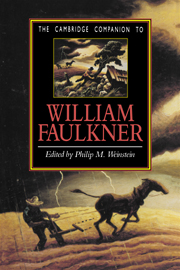3 - Faulkner and the Culture Industry
from Part I - The Texts in the World
Published online by Cambridge University Press: 28 May 2006
Summary
"Thanks for your heart, Bart"
- Barton FinkBoy meets girl.
Boy sues girl.
Boy meets girl.
Boy sues girl.
- William Faulkner“Sometimes I think if I do one more treatment or screenplay” Faulkner complained in 1944, after a decade of intermittent screenwriting in Hollywood, “I lose whatever power I have as a writer” (Wilde 309). The myth of the artist corrupted by newly dominant commercial media like the movies and magazines has become the modern counterpart to the nineteenth century’s myth of the serious writer condemned to popular neglect (H. N. Smith 3-15). Rather than Hawthorne’s fury at the “damned mob of scribbling women” or Melville’s lapse into obscurity and eventual silence, the 1920s and 1930s produced legends about Faulkner and Fitzgerald squandering years hack writing in California’s Babylon.
Two reflections on the new market conditions for writing after World War I - one imaginative, the other theoretical - may help us understand what the mass media were to mean to Faulkner’s generation. In their 1991 film Barton Fink, Joel and Ethan Coen illustrate the destructive effect of Hollywood on the serious writers who sought to make fortunes there while preserving their artistic integrity. Barton Fink, launched by the triumph of his first Broadway play in 1941, agrees hesitantly to his agent’s offer of a lucrative screen writing contract with "Capital Pictures/7 A week of writer’s block on his first assignment drives Fink to consult another writer, who chances to be a famous Southern novelist - America’s greatest living novelist, according to Fink’s startled salutation of Bill Mayhew in the studio men’s room.
- Type
- Chapter
- Information
- The Cambridge Companion to William Faulkner , pp. 51 - 74Publisher: Cambridge University PressPrint publication year: 1995
- 5
- Cited by

